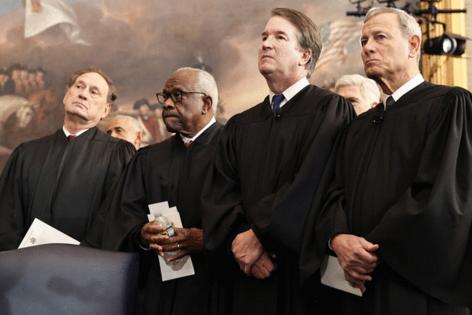Supreme Court for now allows US to hold funds it wants to rescind
Published in News & Features
WASHINGTON — The Supreme Court on Tuesday temporarily allowed the Trump administration to hold on to billions in foreign aid funds that it wants to cancel, setting up a high-stakes battle over the president’s power to unilaterally cancel funds mandated by Congress.
The one-page order, signed by Chief Justice John G. Roberts Jr., paused the part of a lower court ruling that required the government to pay some $4 billion of the $4.9 billion rescissions request that the Trump administration sent to Congress last month.
The Supreme Court order also asked the initial challengers to the funding freeze to respond by this Friday.
The administration submitted an application Monday arguing the lower court ruling that requires payment of the $4 billion by Sept. 30 interfered with its negotiations with foreign governments and the intended use of a 1974 law to cancel the spending.
The remaining $900 million in the rescissions request covers payments to the United Nations and other organizations that aren’t part of the court case, the Justice Department said in its application Monday.
Tuesday’s order puts the justices at the heart of ongoing funding discussions in the waning days of the fiscal year, as members of both parties have criticized the Trump administration’s effort to cancel funding from a bipartisan funding bill ahead of the Sept. 30 deadline.
The administration submitted the rescission request last month under the 1974 law known as the Impoundment Control Act. The rescission request allows the administration to pause certain spending for up to 45 days for Congress to consider a vote to rescind the appropriation of the funds.
The Trump administration has already used the procedure once this year, when Congress passed a rescissions request to claw back $9 billion in appropriations.
The 45-day period for the current request overlaps with the end of the fiscal year on Sept. 30, and administration officials have argued that if Congress doesn’t vote by then the funds are effectively canceled. The request is currently pending before the House and Senate Appropriations committees.
Democrats and a few Republicans have roundly criticized the strategy. On Tuesday, Sen. Thom Tillis, R-N.C., said that “Congress should be involved” in appropriations decisions and that he would support efforts to limit the use of pocket rescissions in the future.
“I’m not criticizing the Article II branch for trying to be as powerful as they can be. I’m pulling for the Article I branch to assert its authority over appropriations,” Tillis said. “I think they overreached. I hope they lose. If they win, I think we should do everything to prevent them from ever being successful and doing a pocket rescission again.”
The legal challenge over the funds began in February when the administration sought to dismantle the U.S. Agency for International Development and freeze other foreign aid.
Judge Amir Ali of the U.S. District Court for the District of Columbia eventually found that the freeze violated federal law, particularly the ICA. Over the summer, a three-judge panel of the U.S. Court of Appeals for the District of Columbia Circuit wiped out Ali’s ruling and sent the case back to his court.
Last week, using a separate legal justification, Ali then ruled that the Trump administration still had to pay the funds, which now totaled more than $10 billion, by Sept. 30. Ali and the D.C. Circuit then denied the Trump administration a request to stay the portion of that $10 billion that overlapped with the rescissions request.
The challengers to Trump’s funding freeze have urged the justices not to grant the request, arguing it would upset a constitutional order that gives Congress the power of appropriations.
The case is Department of State, et al. v. AIDS Vaccine Advocacy Coalition, et al.
_____
©2025 CQ-Roll Call, Inc., All Rights Reserved. Visit cqrollcall.com. Distributed by Tribune Content Agency, LLC.







Comments